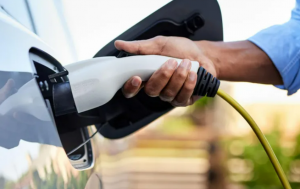Chinese electric cars may become pricier in the European Union (EU) after politicians called them a threat to its own industry.
It has “provisionally concluded” that Chinese electric vehicle (EV) manufacturers will face tariffs from 4 July “should discussions with Chinese authorities not lead to an effective solution”.
The EU’s announcement comes as it continues an investigation into what it claims is a flood of cheap, government-subsidised Chinese cars into the trade bloc.
China alleged the tariffs violated international trade rules and described the investigation as “protectionism”.
EV makers who co-operated with the investigation, which the EU’s governing European Commission launched in October, will face an average 21% duty, while those who did not will face one of 38.1%.
Meanwhile, specific charges will apply to three companies:
BYD: 17.4%
Geely: 20%
SAIC: 38.1%
Non-Chinese car companies who produce some EVs in China, including EU-based ones like BMW, will also be affected.
The commission said Tesla may receive an “individually calculated duty rate” because of a specific request it had made.
These charges would come on top of the current rate of 10% tariff levied on all electric cars produced in China.
The EU’s intervention comes after the US made the much bolder move of raising its tariff on Chinese electric cars from 25% to 100% last month.
Why the EU might be about to make Chinese electric cars more expensive
Biden quadruples tariffs on Chinese electric cars
The decision has drawn criticism not just from China, but also from politicians within the EU and several industry figures.
China’s foreign ministry spokesperson In Jian said the “anti-subsidy investigation is a typical case of protectionism”.
He added that the tariffs might also risk damaging “China-EU economic and trade co-operation and the stability of the global automobile production and supply chain”.
The tariffs will apply definitively from November unless there is a qualified majority of EU states – 15 countries representing at least 65% of the bloc’s population – voting against the move.
Germany’s Transport Minister, Volker Wissing, said it risked a “trade war” with Beijing.
“The European Commission’s punitive tariffs hit German companies and their top products,” he wrote on X, formerly known as Twitter.
The ACEA, the European Automobile Manufacturers’ Association, said that “free and fair trade” was essential in making sure that the European car industry remains competitive.
They added, however, that it was just one piece of the puzzle when thinking about how to boost the adoption of electric cars.
Mercedes-Benz and Stellantis — which owns Citroën, Peugeot, Vauxhall, Fiat, and several other brands — also spoke out, emphasising the importance of free trade.
Stellantis said it does not support measures that “contribute to the world fragmentation [of trade]”.
Some EU car companies have called for a bloc-wide industrial policy to deal with global competition.
BBC

